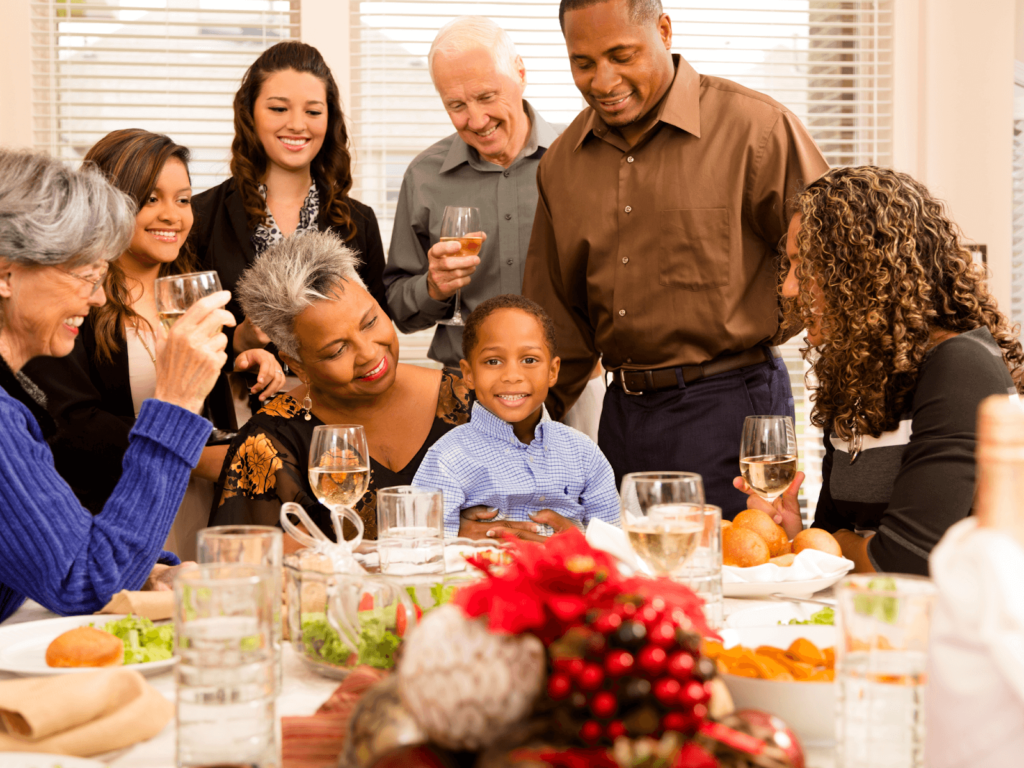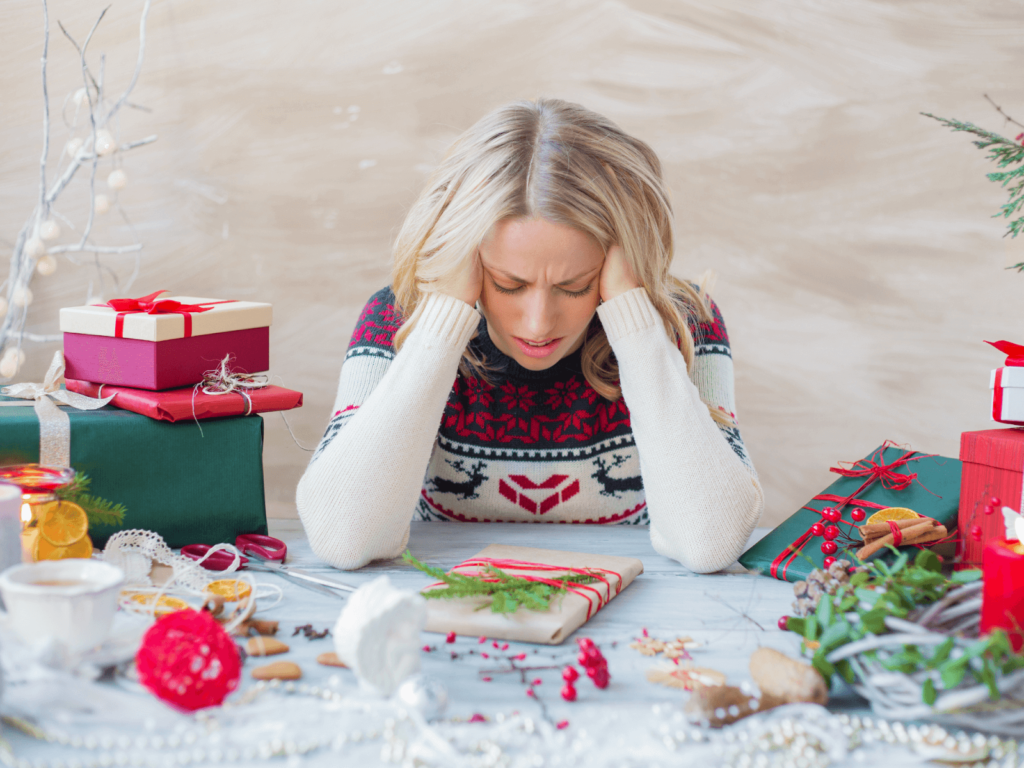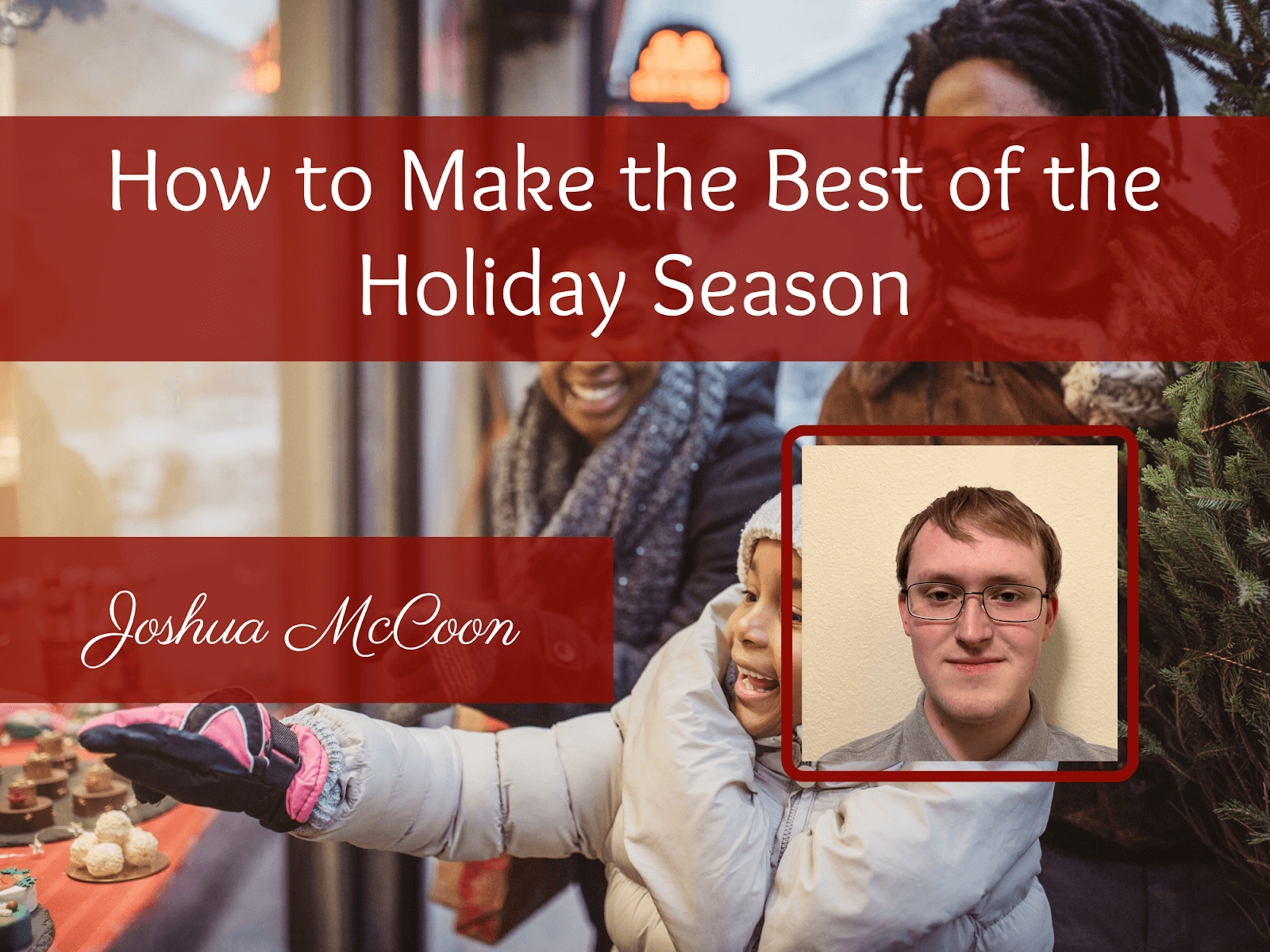It’s the most wonderful time of the year! The holidays are a time filled with family time, joy, love, and happiness. But it can also bring up feelings of stress, sadness, overwhelm, anxiety, and anger. People can have differing expectations regarding holiday traditions, time with family, and obligations. Sometimes, the holidays just don’t feel fun anymore.
We talked to Kenosis associate, Joshua McCoon, to learn how to make the best of the holiday season. He is a licensed mental health counseling associate (LMHCA), and he works with the general population to improve their overall mental health. In this article, Josh shares reasons people can feel more overwhelmed than usual, how to make the holidays fun again, how to set boundaries to set with loved ones, and tips to overcome heightened stress.
Why We Can Feel More Overwhelmed During the Holidays
The memories of old holiday seasons is one reason Josh says you can feel more overwhelmed or stressed. There’s a lot of connection to family during this time. Especially if there’s been a loss in the family, the holidays tend to bring out feelings of grief and sadness in people. Lily Snodgrass, Kenosis counselor, adds, “Holidays are oftentimes traditional and involve certain rituals. When doing these traditions without the person who has passed away, the absence becomes quite apparent. Individuals may experience immense sadness or longing for the person who has passed. Some may feel guilt around the holidays, feeling like they should not do traditions or celebrate without their loved one.”
Along with that comes the stress of logistics. Every family wants time with you. It can be difficult to navigate who to spend time with on what day. Not to mention, if you have to travel long distances and coordinate flights it can add additional emotional and financial stress. The logistics around making holiday plans with several people can cause major stress.
This time of year can also be challenging for those who struggle with Seasonal Affective Disorder (SAD). SAD is a form of depression that’s associated with the changing of the seasons. When the days get shorter and it’s cold and gloomy, it can affect your mood. There is less opportunity to get fresh air and sunlight. Depending on your job, there may be days you don’t even see the sun! So although the holidays are supposed to be fun, you can feel down and sad.
All these stressors around the holidays can exacerbate anxieties, like work, money, relationships, or health. It is easy to see how the buildup can cause people to be on edge during the holidays.

Imagining The Ideal Holiday
People have a lot of expectations and standards for the holidays. There’s often an attempt to achieve the perfect holiday that you see in movies. Joshua explains, “There are often some pretty high standards for what holidays are going to be like. There’s got to be all of these things that have to be just right. It just creates more conflict and stress. Trying to make it perfect is a whole lot harder than it looks.” It puts unnecessary stress on everyone involved in trying to make the perfect holiday.
Instead, don’t try to force it and keep it simple. It doesn’t need to be perfect, but examine the most important things to you and your family. Perhaps it’s going to church together on Christmas Eve. Can you sacrifice the time making Christmas cookies as a family and prioritize the Christmas Eve service? These decisions are very personal to your family, but we encourage you to take the time to discuss how the holidays will look in a way that feels good to everyone.
Setting Boundaries
Boundaries are always important, but especially during the holiday season. There are things you can do as an individual, but at a certain point, there also is some reliance, cooperation, and mutual limits with other people.
In terms of what you can do, one idea is to set time limits with people. Josh explains, “Some of this can be in the day-to-day – how much time is spent by yourself, by you and your immediate family group, and other extended family? Sometimes it can be a matter of you wanting to spend time with this person, but you don’t want to spend your entire holiday just with those people. Setting some time limit boundaries there can be pretty good.”
You can outline and communicate preemptively how long you’re planning to spend with them. Give yourself a good pace of how much time each family will get with you. Every day, you add more onto your plate with more people, food, and logistics that need to be sorted out. All those things can increase your stress. Make a plan before the holiday and stick to it.
Another boundary is setting ban lists. What are some things you don’t want to talk about with your family? This could include:
- Politics
- Certain people
- Relationship status
- Employment choices
- Old family disagreements
Make it clear the topics you will not engage in. This goes back to relying on others to respect your boundaries. However, you can choose to remove yourself from the conversation if certain topics are brought up.
Establish consequences if/when your boundaries are violated, which is another important thing to remember. Decide how to respond if someone doesn’t respect the boundaries you’ve set. Saying no and standing up for yourself is empowering and a huge part of self-care. Communicate your boundaries beforehand, and if they aren’t respected, make a plan for how to respond.

Tips to Overcome Stress During the Holidays
If you’re someone who succumbs to stress and anxiety during the holidays, here are some tips to help you overcome it.
Start with the Basics
Basic self-care practices are easily forgotten during the holiday season. Eat nutritious food, get enough sleep, drink plenty of water, and get some exercise. Self-care and alone time are important to continue during the holidays.
Do Non-Holiday Activities
Josh recommends continuing to do non-holiday things. He says, “Allow yourself things that aren’t all focused on setting up for whatever holiday is coming. Doing normal things can be easy to lose touch with.” This can include food, music, weekly plans, and your environment.
Be in the Moment
Don’t waste time in the nostalgic past or idealized future. Practice mindfulness and being in the moment with your family. There are a lot of things to do, but mentally planning and preparing for each one wastes the time you set aside to enjoy the present activity.
Combine Holidays to Ease Strain
Joshua’s family has started combining holidays. His family is scattered around the country, and they’ve started combining Thanksgiving and Christmas into a single event. He shares, “It minimizes the logistics and activities we do for each holiday. We just combine it all into one thing. It’s something that I’ve found in my family that has been pretty effective for reducing some stress.”
Include Lost Loved Ones
Lily recommends individuals continue to incorporate their loved ones in traditions. Acknowledge the absence of the loved one rather than avoid it. Allow space for people to express or process their feelings and promote open communication about the loved one.
We understand how the holidays can become a burden and additional stressor. We hope this article helped you see a different perspective on enjoying the holidays. It’s a special time to celebrate the birth of our Savior and spend quality time with loved ones. If you struggle during the holidays, would like to prioritize self-care, or learn how to set boundaries, contact us today. We have appointments available to help you through the holiday season.

